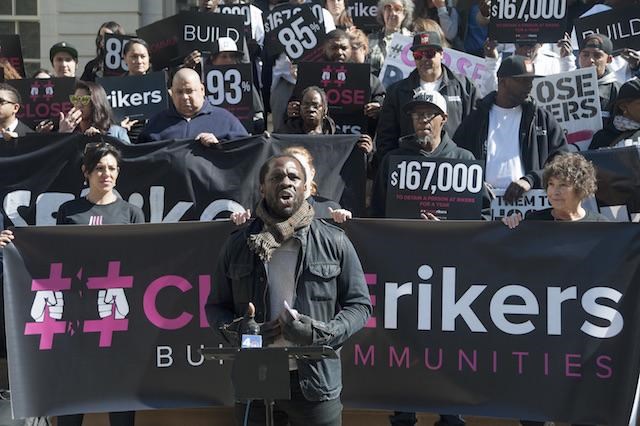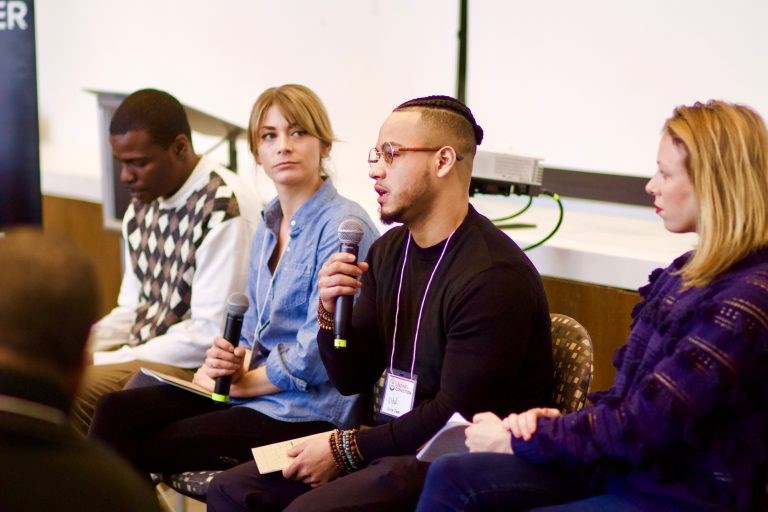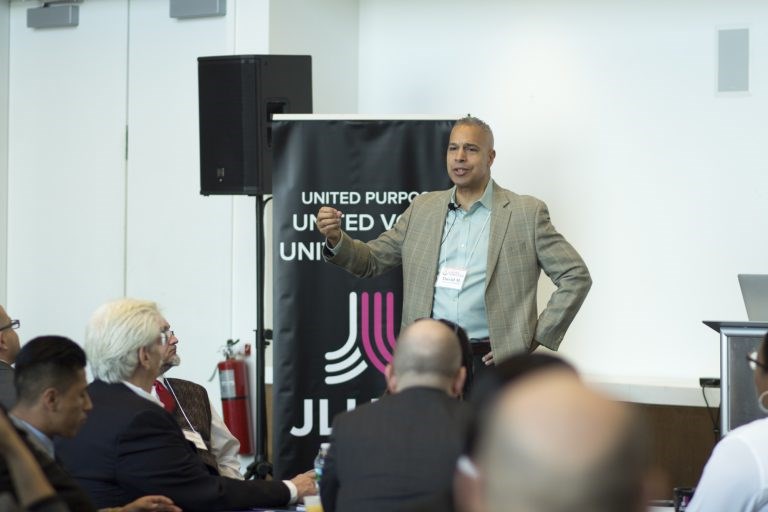Just Leadership USA, an organization dedicated to cutting the country's prison population in half, is co-sponsoring a panel at Brooklyn Law School to discuss what closing Rikers Island would mean for Brooklyn

One in three black men in America will be imprisoned in his lifetime which is an example of the sickening racial disparities rampant in the criminal justice system, Dylan Hayre says.
[perfectpullquote align="left" bordertop="false" cite="" link="" color="" class="" size=""]"There's a clear line that can be drawn from slavery, to Jim Crow, to segregation, to today's state of mass incarceration." [/perfectpullquote]
Hayre is a senior policy expert with Just Leadership USA (JLUSA), a national membership-driven advocacy organization dedicated to cutting the country's prison population in half by 2030. He says today's criminal justice system is a weapon of mass oppression, targeting poor people and people of color, that has affected over 70 million people.
"There's a clear line that can be drawn from slavery to Jim Crow, to segregation, to today's state of mass incarceration."
JLUSA was formed in 2014 to get people involved in criminal justice reform, people who had been directly impacted by the system. Promoting and empowering those previously incarcerated - and their families and communities - is the way to fix the problem and to drive reform, Hayre says.
"We were founded on the core value that those closest to the problem are closest to the solution, but often farthest from resources and power."

Often societal stigma and marginalization, along with the regular challenges posed by reintegration, have kept formerly incarcerated people out of advocacy, Hare says. But JLUSA hopes to change that through leadership training and targeted advocacy.
JLUSA holds multiple training programs for reform leaders that can span from one day to one year. The programs are designed to give participants the tools and networks to bolster their own advocacy and become stronger community leaders.
The organization is most well-known for its campaign to close Rikers Island. The #CLOSErikers campaign, organized by those who'd been held at the prison, has taken its mission from a lofty ideal to the stated city policy of New York.

"Now almost anyone who wants to run for office in New York City has to be on board with the overall goal of closing Rikers as soon as possible," Hayre says.
[perfectpullquote align="right" bordertop="false" cite="" link="" color="" class="" size=""]"These laws keep legally-innocent people trapped in jail based on their wealth or where they come from."[/perfectpullquote]
To close Rikers and lower the prison population substantially, a statewide criminal justice reform is needed. The organization launched a second campaign, #FREEnewyork, which urges Governor Cuomo and elected officials to do an overhaul of bail, discovery and speedy trial laws.
"These laws keep legally-innocent people trapped in jail based on their wealth or where they come from," Hayre says.
JLUSA is getting ready to launch a third campaign, #WORKINGfuture, to create partnerships with directly-impacted communities and organizations seeking to eradicate employment-related discrimination, an issue people with criminal records face all too often. On top of its campaigns and training programs, the organization plans to do a membership drive this year and to continue to build partnerships with reform advocates in other states.

On Wednesday, March 28, Just Leadership will be co-sponsoring the panel discussion "Decarcerate Brooklyn: What Closing Rikers Means for Our Borough" with elected officials and community activists including Borough President Eric L. Adams, Councilmember Stephen Levin, Attorney-in-Charge of Criminal Practice at the Legal Aid Society Tina Luongo, JustLeadership USA Member and #CLOSErikers campaign leader Darren Mack and Marilyn Reyes, community organizer and #CLOSErikers campaign leader.
With nearly 400 trained leaders from 31 states, JLUSA keeps growing. The organization is currently setting up a second office in Washington D.C., to add to its main office in Harlem.
To attend "Decarcerate Brooklyn: What Closing Rikers Means for Our Borough" on March 28 at the Brooklyn Law school, RSVP here.



